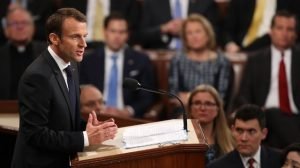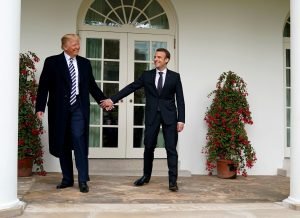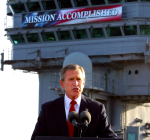Words Falling on Disabled Ears
French President Emmanuel Macron’s speech to a joint session of the American Congress last week received, I suppose, the requisite amount of pomp-and-circumstance attention. But only a few of the chorus of columnists, and assorted other punditti, appeared to pay much attention to what Macron actually had to say.

Emmanuel Macron, before Congress.
Partly, the indifference to the ideas of one of Europe’s more prominent current advocates of democratic society can be put down to the media’s titillated fascination with the “bromance” between the 40-year-old French president and U.S. president Donald Trump. It all began last year when Macron invited Trump to attend the annual Bastille Day celebration in Paris as an honoured guest. Trump was impressed – bigly! — by the military parade rolling down the Champs-Elysees boulevard, and by the well-mannered Macron not treating him like a moron or a pariah. As a result, Trump not only decided to have a big military parade of his own in Washington this year, but when it came time for the American president to host a visit by a foreign head of state for the first time, Macron was the natural choice.
While the charming Frenchman was the obvious selection on social grounds, he was hardly picked because of his political views. The “@real” Donald Trump, as he styles himself on Twitter, is probably politically closer to China’s Xi Jinping, Russian president Vladimir Putin, or to various lesser political thugs and mafia dons. However, if Melania Trump’s going to go to the trouble of overseeing a state dinner for 125 (right down to the nectarine tart for dessert), Macron is the appropriate visitor.

Macron addresses a joint meeting of the U.S. Congress.
The French president’s ostensible political mission in Washington –while being wined, dined, and treated to a tour of George Washington’s home at Mt. Vernon, Virginia — was to modify, however slightly, Trump’s views on the Iran nuclear treaty, tariffs against Europe, the Paris climate change agreement, nationalism, democracy, rule of law, tolerance, multi-lateralism and various other minor points of political philosophy. Predictably, that agenda was doomed to failure from the start, notwithstanding an end of the week follow-up in the form of a quick working meeting between Trump and German Chancellor Angela Merkel.
Rather than futile speculation on the unlikely prospects of political concordance, the media understandably doted on affection and bonhomie. As the New York Times put it in a one-sentence tongue-in-cheeky lede on “Le Bromance,” “The couple seemed happy to be together again.” The story noted that “their body language went well beyond the usual respectful handshakes of two world leaders… and bordered on the intimate.”

Trump and Macron, “true bromance.”
The Times duly checked off the tokens of affection: “There was a mutual kiss on the cheek in the East Room [of the White House] where Mr. Macron clasped hands with Mr. Trump, pulling him in for an embrace and a brief peck as Mr. Trump puckered his lips slightly to reciprocate.” Wow! shades of Fifty Shades of Gold. The American president was duly quoted: “I like him a lot,” Trump told the media and onlooking officials. Nor did the press forget to mention that in the Oval Office, “the president had gently brushed what he said was dandruff off Mr. Macron’s shoulder. ‘We have to make him perfect,’ Mr. Trump, 71, said of the trimmer Mr. Macron, 40. ‘He is perfect.’ Moments later, as they sat side by side, Mr. Macron placed his hand on Mr. Trump’s knee.” (Julie Hirschfeld Davis and Katie Rogers, “Le Bromance: Trump and Macron, Together Again,” New York Times, Apr. 24, 2018.)
All this homosocial news splashed across my Facebook Feed, where gay pals, veteran viewers of “Queer Eye for the Straight Guy,” complained that the stylish Macron could do much better than Lumpy Trumpy. Why doesn’t he go after Canada’s juicy, yummy Prime Minister Justin Trudeau? they wanted to know. One wag, politely not noting that Macron’s wife, Brigette, is 65, pointed out that it was because Macron is a gerontophile. Okay, enough! This could go on all day.
Once all the foofaraw was over, and the various coutouriers duly identified (Melania wore Chanel; Mrs. M. went with Louis Vuitton), it was time for Macron to address a joint session of the U.S. Congress. As the German newsweekly Der Spiegel noted, “The worldview Macron laid out in Congress contradicts Trump’s own on virtually every single point.” The Associated Press news story fastened on Macron’s remarks rejecting the “‘illusion of nationalism,’ in a candid counterweight to Trump’s appeals to put ‘America First’.” (Julia Heyer, “From Paris with Love,” Der Spiegel, Apr. 27, 2018; “Macron Resists Trump’s ‘America First’ in Speech to Congress,” The Associated Press, Apr. 25, 2018.)
Macron, speaking in English, told American lawmakers, “We can choose isolationism, withdrawal and nationalism. This is an option. It can be tempting to us as a temporary remedy to our fears.” However, “closing the door to the world will not stop the evolution of the world. It will not douse but inflame the fears of our citizens.” The French president urged against letting “the rampaging work of extreme nationalism shake a world full of hopes for greater prosperity.” He condemned isolationism, arguing that pulling away from world affairs invites a vacuum. “Other powers… will then fill the void we would leave empty,” he warned. “You can play with fears and anger for a time. But they do not construct anything.” Nor was Macron happy about the current wave of autocratic leaders. “Personally, I do not share the fascination for new strong powers, the abandonment of freedom, and the illusion of nationalism,” Macron said, in remarks that could be taken as a direct rebuke of Trump’s enthusiasm for various world “strongmen.”
In attacking nationalism, Macron reminded the Americans that it was up to the U.S. to uphold the international order it had created. “We have to shape our common answers to the global threats we are facing,” said Macron, calling for a new “strong multilateralism.” Indeed, “multilateralism” was Macron’s keyword throughout the speech. “The United States is the one who invented this multilateralism. You are the one now who has to help preserve and reinvent it.”
While the address was delivered with charm and politesse, and a lot of boilerplate rhetoric about the two centuries’ long-standing friendship of France and the U.S., the message was unmistakably clear to everyone, including the Republican representative from Kentucky, who tweeted, “French President is a socialist militarist globalist science-alarmist.” In reality, Macron was offering a classic case for the liberal order, international law, a free press – all the markers of democracy that Trump rides roughshod over every day. It was at once shocking to realize that a defense of the values most of us (liberals and social democrats) believe in was needed — almost as if we, too, have fallen into a general amnesia — and, at the same time, rather quaint to hear time-honoured shibboliths trotted out with such sincerity in an era of late-night irony.
On immediate practical matters, Macron denounced Trump’s trade-war-inciting decision to impose steep tariffs on steel and aluminum products. The response to the challenges of global trade, he argued, should not be “massive deregulation and extreme nationalism. Commercial war is not the proper answer. At the end of the day, it will destroy jobs, increase prices, and the middle class will have to pay for it.” Rather, problems should be solved by negotiating at the World Trade Organization (WTO), an institution that enforces global trade rules, and which Trump has recently dismissed as “a disaster.” Macron reminded his auditors, “We wrote these rules. We should follow them.” A couple days later, on May 1, when Trump had to decide whether to impose the tariffs on U.S. allies or to exempt them, instead, he delayed their implementation, which only added to economic uncertainty for Europeans.
Macron was perhaps most passionate when it came to the issue of global climate change, and the 2015 international Paris climate accord, a pact from which Trump arbitrarily withdrew the U.S. last June, to satisfy the science-denying (and science-ignorant) base of his supporters – the people who think Macron is a “science alarmist.”
“What is the meaning of our life if we are destroying the planet while sacrificing the future of our children?” the French president asked. “Let’s face it,” punned Macron, “There is no Planet B.” He added that he was sure that “one day the United States will come back and join the Paris agreement” and downplayed the dispute with Trump as merely “a short-term disagreement.” Borrowing a phrase from his American host,, Macron said, “Let us work together to make our planet great again.”
The most immediate of the geopolitical issues Macron addressed was the 2015 nuclear non-proliferation accord between Iran and a large consortium of powerful nations, including the U.S., China, Russia, and the European Union (EU), from which Trump is now threatening to withdraw U.S. participation. The question was rendered almost moot barely minutes after Macron’s arrival at the White House Oval Office. No sooner had the initial amenities been exchanged than Trump, being questioned by the press gaggle covering the photo op, chose to deliver a tirade against the multi-national deal in which Iran had agreed to cease development of potential nuclear weapons in return for global economic sanctions relief – a deal, by the way, that everybody involved agrees that Iran has been abiding by since its implementation.
As Macron sat next to his American counterpart, he and the media were subjected to an episode in which Trump worked himself up into a self-generated rage, calling the agreement “insane,” a “disaster,” “shameful,” all the while lamenting the “barrels of cash” that the U.S. had turned over to Iran. For a moment, it looked like the American president was having a genuine meltdown. After Trump’s tantrum, it was hard to see where the discussion between the two men could go, although Macron attempted to maintain his Gallic aplomb.
At his Congressional address a day later, Macron was perfectly clear that if the U.S. pulled out of the accord, France would not follow Trump’s lead. Instead, he reiterated, “We signed [the accord] at the initiative of the United States. We signed it, both the United States and France. That is why we cannot say we should get rid of it like that.” Macron was arguing for the benign, orthodox notion that parties to an agreement ought to keep the agreement. He warned that America’s Iran policy could lead to a new war in the Middle East. The sovereignty of all nations must be respected, Macron said, even that of Iran. Again, there was the slightly surreal sense that the French president was advocating Democracy 101 in the very chamber in which much of American democracy is housed.
Trump is slated to make a final decision on whether the U.S. will continue to support the accord or withdraw from it on or before May 12. Macron publicly conceded that the agreement covered only limited aspects of the ongoing dispute with Iran, and mused aloud about a more “comprehensive” pact, while at the same time urging Trump to “build” on the accord rather than destroying it. But whatever hopes Macron had gone in with in terms of modifying Trump’s views seemed more like whistling past the graveyard.
And that, apart from the mostly partisan cheering and requisite handshakes, was the Macron speech. Since presidents don’t customarily attend joint Congressional addresses, it was hard to know – though probably easy to guess – whether Macron’s words had any effect on Trump, or even if Trump heard them. For all we know, the American president might have been squirreled away in his multi-screen bunker, watching Fox News or “InfoWars” or Breitbart, while simultaneously tweeting away. Or if he did tune in to Macron’s speech, the whole thing might have amounted to little more than words falling on what we used to call “deaf ears,” but which, in these more enlightened times,we probably ought to refer to as ears that are ideologically “disabled.”
Before departing the august halls of Congress with its fading echoes of Macron’s rousing speech (or, well, if not rousing, his perfectly sane defense of bourgeois democracy), it would be remiss not to mention an aspect or two of the present climate of political nuttiness. Writing about Macron’s talk more than a week after its delivery reminds me once more of how Donald Trump has speeded up “time” (a.k.a. “the news cycle”). Already, in the few days since the speech, Trump has produced so much more Reality Presidency (resignations, hirings, lies, tweets, admissions of payoffs to porn stars, peace negotiations, rallies of his supporters, mafia-like threats, more tweets…), that I find myself wondering if potential readers can even recall who Emmanuel Macron is or that he was accorded the rare hnour of delivering a Congressional address.
Once he wrapped up his head of state duties, Macron popped over to a local university, took off his jacket, and engaged a packed auditorium of students in an impromptu hour-long conversation (in English and without notes), and then met the press for a lengthy Q. and A. European reporters, who actually seemed to pay attention to Macron’s address (as evidenced by the subsequent coverage of his sharp political differences with the American populist) had lots of questions for the man who is assuming the role of chief spokesman for EU democracy. The most touching question came from the German Der Spiegel journalist. How far, she wanted to know, can Macron’s sincerity take him with someone like Trump? Is it even possible to trust Trump?
“Yes,” replied Macron without hesitation. “He then quotes the philosopher Emmanuel Levinas. Trust is something you give to someone, it isn’t something that the other person has to earn.” Macron adds, “I have given him my trust.”
I don’t even want to delve into whether Macron means this particular sentiment, or perhaps we should call it a commitment. But to hear an Ecole Nationale D’Administration-educated politician in the coarsened culture of Washington, D.C. quoting a mid-20th century French existentialist philosopher and survivor of a Nazi POW camp is almost enough to inspire some healthy weeping. Certainly, it’s enough to make one nostalgic for the days when there really was an “elite,” before it became a swear-word in populist political vocabularies.


